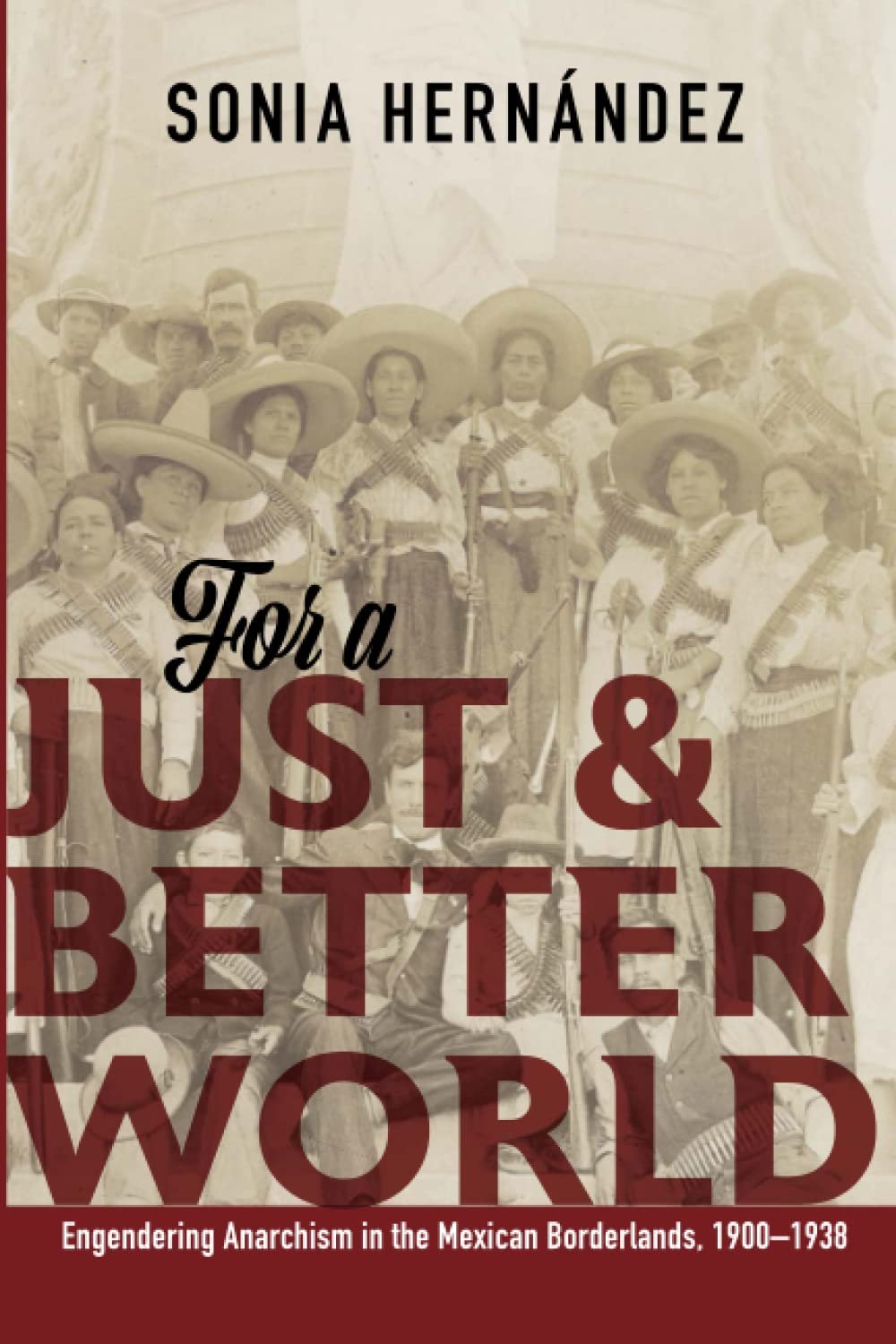In For a Just and Better World: Engendering Anarchism in the Mexican Borderlands, 1900-1938, Sonia Hernández takes us on a historical journey utilizing archival documents related to the transnational labor and anarcho-syndicalist movements of the early 20th century. By applying a feminist perspective, Hernández develops a gendered history that highlights the contributions of women in the global labor movement. Hernández also explores various topics such as Revolutionary Motherhood and motherhood as a rhetoric; the significance of media in identity labeling; the circulation of news during the 20th century; the inequalities women activists faced within and outside labor unions, and lastly, the power of global organizing. Weaved throughout each chapter, Hernández forefronts the significance of the anarchist movement: the fight for freedom and the freedom to envision a just and better world.
“By centering on female anarchists and organizers, Hernández brings to the forefront their marginalized voices, ideas, goals, and contributions, thus providing a gendered and more inclusive history. ”
The book begins by focusing on the type of revolutionist environment that gave rise to the feminist and anarchist Caritina Pina in Tampico, Mexico. In its exploration of Pina’s role as the head secretary of the Comité Internacional Pro-Presos Sociales–essentially the role of a global labor broker and organizer—Hernández traces global contributions made by Pina and other prominent women within the labor movement. By centering on female anarchists and organizers, Hernández brings to the forefront their marginalized voices, ideas, goals, and contributions, thus providing a gendered and more inclusive history. Through Hernández’s archival research, they string together documents from archives around the globe that portray the significant contributions of Pina and other women. Hernández states that through their utilization of the press, Pina and others—without moving from their hometowns—operated at a global level, disseminating their intellectual ideas on the anarcho-syndicalist movement in a transnational, or borderless, world. Through the expression and circulation of their ideas about labor inequalities, women like Caritina Pina fought for a seat at the table in a male-dominated labor movement. Furthermore, the women’s borderless operation and impact shaped 20th century Mexico into a renowned intellectual hub. In a world that reproduces colonial hierarchies and seeks to make global south contributions invisible, Pina and other women’s establishment of (and Hernandez’s reclaiming of) Mexico as a place of radical and forward moving intellectual ideas, is revolutionary. Despite these contributions, however, Hernández ruminates on the dead-end they were met with—a dead-end that often met many female and female activists like Caritina Pina within the archives.
Hernández moves on to specifically examine the transformation of anarchist labor movements in Mexico. They claim that anarchism, due to its foundation on freedom and equality, produced opportunities for women to express their own interests and contribute to the “lucha”. Essentially, anarchist theory, when put in practice, lead to direct action, possibilities for women, and transnational organizing. Hernández claims that the women who were first involved in these labor organizations, such as Pina and the women who came before her, experienced more freedom than was common in the religious state that often oppressed them through the politicization of motherhood and morality. However, as labor movement organizations transformed, they began to adhere to state politics and adopted similar oppressive attitudes towards women. Thus, women who had initially found refuge and freedom within the labor movement, were gradually disillusioned and pushed out.
“[Hernández] reminds us about unity, female emancipation and empowerment, and about the fight for freedom. . . Hernández calls us to envision a free world rooted in equality. ”
Hernández establishes a historical pattern: once an organization was union-backed, they started following state-led policies meant to curve prostitution through the control of female bodies and female labor. Female waitresses were most affected, experiencing the strictest surveillance and control through the regulation of sexuality and morality. These discriminatory regulations eventually forced many waitresses to make the difficult decision of letting go of their benefits in a union-backed organization that did not have their best interests at heart and instead collectively organize for each other through a grassroots organization known as the meseras libres, or free waitress movement. This, Hernández claims, was an act of Feminist Anarchism. (1) However, despite the success in establishing the meseras libres, their organization ultimately did not experience the same amount of success as other unions due to the brutal repression they experienced from the state. (2) By examining this history, Hernandez portrays how women were active participants within the fight for equal labor rights but ultimately not given the same outcomes as their male counterparts. The disproportionate outcomes lead many women to “leave unions to the men” (3) and instead adopt disengaged attitudes about organizing, freedom, and equality.
Although achieving a provocative description of the inequalities that feminist labor activists faced in the 20th century, Hernández does not leave readers helpless. Instead, she reminds us about unity, female emancipation and empowerment, and about the fight for freedom. In conclusion, Hernández calls us to envision a free world rooted in equality.
1 Hernandez, Sonia. 2021. For a Just and Better World: Engendering Anarchism in the Mexican Borderlands 1900- 1938. Pg 112
2 Ibid 112
3 Ibid112.
Dr. Sonia Hernández earned Bachelor and Master's degrees in History from the University of Texas-Pan American as well as a PhD in Latin American History from the University of Houston. She is a former UT Board of Regents Scholar and Fulbright scholar. Dr. Hernández's research focuses on the intersections of gender and labor in the U.S.-Mexican Borderlands, Chicana/o history, and Modern Mexico. She is the author of Working Women into the Borderlands (Texas A&M University Press, 2014) and For a Just and Better World: Engendering Anarchism in the Mexican Borderlands, 1900-1938 (University of Illinois Press, 20121). A highly awarded scholar, her works have won the Sara A. Whaley Book Prize (NWSA), the Liz Carpenter Award (TSHA), and the Philip Taft Labor Book Award (Cornell & LAWCHA). Dr. Hernández is currently an Associate Professor of History at Texas A&M University.









